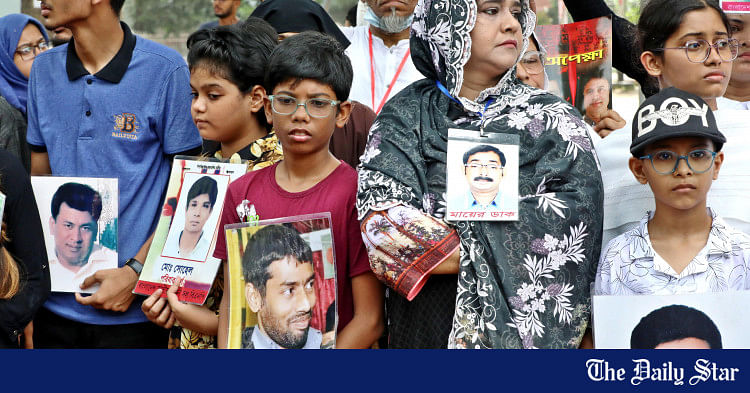Saif
Senior Member
- Messages
- 17,408
- Likes
- 8,373
- Nation

- Residence

- Axis Group


Another victim of enforced disappearance returns home from India
Another enforced disappearance victim returned home allegedly from India on Saturday, one
 www.newagebd.net
www.newagebd.net
Another victim of enforced disappearance returns home from India
Staff Correspondent 23 December, 2024, 10:55
Another enforced disappearance victim returned home allegedly from India on Saturday, one
year four months after he was picked up by people identifying themselves as Rapid Action Battalion members on August 29, 2023.
The victim is Rahmatullah, an electrician who was picked up from his own house in Dhamrai, human rights organisation Odhikar revealed in a statement issued on Sunday.
His family searched RAB offices, various Detective Branch offices and police stations but all law enforcement agencies denied picking Rahmatullah up.
Rahmatullah was blindfolded and threatened in various places in Bangladesh for nine months and later was taken to India where he was held in Dum Dum jail for ‘illegal entry’, the statement said.
He had been in India for seven months.
The statement read that Indian Border Security Force sent Rahmatullah back to Bangladesh through the Mahananda River on Saturday night.
After entering the country, he arrived at Gomastapur police station in Chapainawabganj from where police contacted his family.
The family later went there and rescued him.
The statement cited examples of Sukharanjan Bali and Bangladesh Nationalist Party leader Salahuddin Ahmad being relocated to India after abduction.
Such incidents prove that Indian authorities were involved in the system of enforced disappearance in Bangladesh, Odhikar said in its statement.
The Commission of Inquiry on Enforced Disappearance recently revealed that they found prima facie evidence of the India’s involvement in the system of enforced disappearance.
According to Odhikar, 721 people have fallen victim to enforced disappearances from 2009 till September 2024. Of them, 158 people were still not found.
Odhikar believe that there is a possibility that more victims may be held in Indian jails after being disappeared from Bangladesh.
The human rights body said that the government should immediately check the information of all Bangladeshis imprisoned in Indian jails to determine if there are any enforced disappearance victims.
It demanded compensation for Rahmatullah and punishment for those involved in his disappearance.
Staff Correspondent 23 December, 2024, 10:55
Another enforced disappearance victim returned home allegedly from India on Saturday, one
year four months after he was picked up by people identifying themselves as Rapid Action Battalion members on August 29, 2023.
The victim is Rahmatullah, an electrician who was picked up from his own house in Dhamrai, human rights organisation Odhikar revealed in a statement issued on Sunday.
His family searched RAB offices, various Detective Branch offices and police stations but all law enforcement agencies denied picking Rahmatullah up.
Rahmatullah was blindfolded and threatened in various places in Bangladesh for nine months and later was taken to India where he was held in Dum Dum jail for ‘illegal entry’, the statement said.
He had been in India for seven months.
The statement read that Indian Border Security Force sent Rahmatullah back to Bangladesh through the Mahananda River on Saturday night.
After entering the country, he arrived at Gomastapur police station in Chapainawabganj from where police contacted his family.
The family later went there and rescued him.
The statement cited examples of Sukharanjan Bali and Bangladesh Nationalist Party leader Salahuddin Ahmad being relocated to India after abduction.
Such incidents prove that Indian authorities were involved in the system of enforced disappearance in Bangladesh, Odhikar said in its statement.
The Commission of Inquiry on Enforced Disappearance recently revealed that they found prima facie evidence of the India’s involvement in the system of enforced disappearance.
According to Odhikar, 721 people have fallen victim to enforced disappearances from 2009 till September 2024. Of them, 158 people were still not found.
Odhikar believe that there is a possibility that more victims may be held in Indian jails after being disappeared from Bangladesh.
The human rights body said that the government should immediately check the information of all Bangladeshis imprisoned in Indian jails to determine if there are any enforced disappearance victims.
It demanded compensation for Rahmatullah and punishment for those involved in his disappearance.







